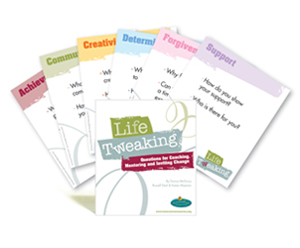Card sets are very useful tools for inviting reflection, conversation and hopeful possibilities to emerge. They are a way of building colour, creativity and variety into your practice—something that can inspire and energise you as well as your clients.
Counsellors, psychologists and therapists are confronted by a huge range of difficult situations. Issues of grief and loss, mental health, trauma, and navigating the ups and downs of emotions and relationships are seldom easy. Resources published by Innovative Resources can help play a part in approaching these issues with a view to generating hope and positive change.
Our card sets can be used to explore:
- what is happening in a client’s life
- the strengths and resources they can bring to the situation
- what works
- what they want to do more of
- their stories, feelings and relationships
- keys to building their own resilience
- their best hopes for the future
- their goals and next steps
- their progress and steps along the way.
Many practitioners have a collection of Innovative Resources’ card sets from which they can select a resource they think will work best for a specific client or situation. Another approach is to place a number of Innovative Resources card packs on a table, counter or shelf—anywhere a client may notice them. For example, cards can be pinned to a noticeboard or stuck on a door or wall where they may attract the client’s attention. This could be called ‘bump-into therapy’—allowing a client’s own spontaneous curiosity about a particular card set to lead the way.
For children and adults alike, the colour and gentle humour in many of our card sets help people find images, metaphors and words to describe what is happening in their lives. Sometimes pointing at a picture allows a communication to happen about how they are feeling, even when they cannot find any words at all to describe where they are at.
Cards or physical ‘artefacts’ seem to readily evoke memories, reflection and storytelling. With their strengths-based messages, our cards can be used to help clients move away from a focus on the problem by encouraging them to talk about their hopes and dreams for the future.
In addition, when a client and a practitioner sit alongside each other and look at a set of cards together, something interesting takes place: it shifts the dynamic created by two people sitting opposite each other. Even placing cards on the floor or on a table, and walking around the cards together, is a great way to introduce movement. This changes the dynamic as well—sometimes in profound ways. Experiment and see what happens, not only for your client, but for you the practitioner as well.







 children alike, and has no words so very versatile with non-English speakers or even very young children (also:
children alike, and has no words so very versatile with non-English speakers or even very young children (also: 
 thoughts. Each of the 50 cards offers a coping strategy that enables people to choose an approach that is right for them.
thoughts. Each of the 50 cards offers a coping strategy that enables people to choose an approach that is right for them.
 could use to share something of their pain and difficulty. It is based on the understanding that sometimes difficulty and loss need to be heard before hope can emerge and pathways to resolution found. This card set consists of forty-eight evocative watercolour images depicting key challenges people sometimes face. Some practitioners like to team these with
could use to share something of their pain and difficulty. It is based on the understanding that sometimes difficulty and loss need to be heard before hope can emerge and pathways to resolution found. This card set consists of forty-eight evocative watercolour images depicting key challenges people sometimes face. Some practitioners like to team these with 
 photographic montage for encouraging adolescents to explore their lives. What do I think? What do I feel? What is important to me? Where am I heading? Each card features a key word and a layer of photographs to illustrate it. By encouraging conversations about the hard stuff, the good stuff and how we get to where we want to be, this is a powerful tool for building identity, self-esteem and goals in adolescents.
photographic montage for encouraging adolescents to explore their lives. What do I think? What do I feel? What is important to me? Where am I heading? Each card features a key word and a layer of photographs to illustrate it. By encouraging conversations about the hard stuff, the good stuff and how we get to where we want to be, this is a powerful tool for building identity, self-esteem and goals in adolescents. sessions. This card set arises out of the work of Roger Lowe (registered psychologist formerly teaching at Queensland University of Technology) and can be used to plan and conduct dynamic strengths-based, solution-focused supervision in any human service field. It can also be used by educators and trainers to teach about the purpose and skills of supervision.
sessions. This card set arises out of the work of Roger Lowe (registered psychologist formerly teaching at Queensland University of Technology) and can be used to plan and conduct dynamic strengths-based, solution-focused supervision in any human service field. It can also be used by educators and trainers to teach about the purpose and skills of supervision.